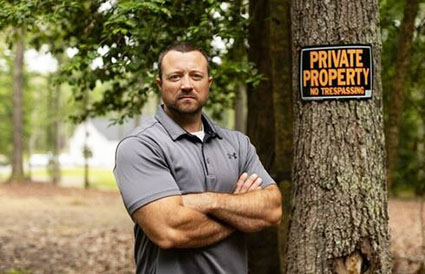by WorldTribune Staff, July 2, 2023
In the 1924 Supreme Court Hester decision, the court ruled that “the special protection accorded by the Fourth Amendment to the people in their ‘persons, houses, papers, and effects,’ is not extended to the open fields.”
Government agents have been exploiting that decision ever since to enter private property without a warrant and the intrusions are becoming more routine under Team Biden, a report said.

Writing in the Stark Realities report on substack.com on July 1, Brian McGlinchey detailed the case of Josh Highlander, who owns a 30-acre spread near Richmond, Virginia.
In April of this year, Highlander’s wife and 6-year-old son were playing basketball in their yard. When his wife went to retrieve a long rebound, she spotted a man in full camouflage walking among the trees. She and her son quickly went inside the house.
When Highlander went outside, he couldn’t locate the man in camouflage, but did discover that a game camera he’d placed in his food plot was gone. When he called police, Highlander learned the man on his property was an agent of Virginia’s Department of Wildlife Resources (DWR), one of three who crossed another piece of private land to enter his property. “Worse, the same trio had taken his camera, holding no warrant for that action either,” McGlinchey noted.
“For weeks, my son wouldn’t play outside in his own back yard because he was afraid of who might be in the woods,” said Highlander. “My camera was taken two months ago, and I’ve still never received a receipt, a warrant or a ticket.”
“While Virginia’s warrantless DWR agents shockingly seized Highlander’s camera so they could retroactively monitor his actions (an act that even the expansive open fields doctrine doesn’t seem to authorize), elsewhere in Virginia and in the United States, government agents are already known to hide their own surveillance cameras on private land,” McGlinchey added.
The Institute for Justice (IJ), which provides free-of-charge representation to victims of government overreach, has filed a suit against the Virginia DWR on Highlander’s behalf, as part of a broader, multi-state campaign against abuses perpetrated under the open-fields doctrine.
IJ’s strategy centers on protections outlined in state constitutions rather than the U.S. Constitution.
“The U.S. Supreme Court’s basis for the open fields doctrine has been that the Fourth Amendment lists ‘persons, houses, papers and effects,’ and none of those things are obviously the same as land,” said IJ attorney Joshua Windham.
“State constitutions often have different texts … in Pennsylvania and Tennessee, the word ‘effects’ is replaced with the word ‘possessions,’ and we say that includes private land. … In Virginia, there’s a textual provision that mentions ‘places,’ and of course [Highlander’s] property is a place,” said Windham, who’s representing Highlander.
In their suit filed in a county circuit court, IJ and Highlander are seeking a declaration that the warrantless search of Highlander’s property and seizure of his camera and its contents violated the Virginia constitution.
“No person at all in this country should have limitless power, and it sure seems like they do,” said Highlander. “It just makes you feel vulnerable, it makes you feel anxious, it makes you feel like someone’s watching you on your own private property.”
Membership . . . . Intelligence . . . . Publish
